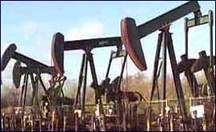 In Kazakhstan, where people worry they may lose their jobs or be jailed for criticising the authorities, some have found a new way to express the economic pain they are feeling: a web site whose name roughly translates as "Oh My God!"
In Kazakhstan, where people worry they may lose their jobs or be jailed for criticising the authorities, some have found a new way to express the economic pain they are feeling: a web site whose name roughly translates as "Oh My God!"
The site, entitled oibai.kz, shows nothing but updated rates for the ex-Soviet oil producer's tenge currency and the world oil price - both of which have been plummeting - against a gloomy black-and-white photo of government buildings.
The only commentary is a soundtrack of sad piano music, while sharing a link to the site on social media adds an exclamation mark and an icon of a man in a traditional Kazakh hat, his hands framing his open mouth in shock.
"There is so much I would like to say, but I can't," complained one Facebook user, explaining in private that she fears speaking negatively of the government would jeopardise her employer's business and the careers of her relatives.
"'Don't blabber', my relatives tell me," she said, adding that she reserves her views for "the kitchen", a reference to the Soviet-era tradition of discussing sensitive topics only with one's family and closest friends.
Kazakhstan, ruled by President Nursultan Nazarbayev for 26 years, is one of a clutch of oil exporting countries whose economies are in crisis now the price of crude is so low.
Fellow ex-Soviet states Russia and Azerbaijan are also experiencing hardship, and further afield, countries such as Algeria and Nigeria are struggling too.
The oil price crash has slashed Kazakhstan's total exports by more than 40 percent. The Kazakh tenge has lost nearly half of its value against the dollar since August when the authorities abandoned their pegged exchange rate policy.
According to government estimates, economic growth slowed to 1.2 percent last year from 4.4 percent a year earlier. But indicators such as electric power output point to a contraction, something which has not been officially registered since 1998.
SELF-CENSORSHIP
In other countries, people have taken to the streets to protest but in Kazakhstan, demonstrations are small and rare, even though the downturn has hit hard.
Most Kazakhs apply self-censorship in public and on online social networks. It is acceptable, for instance, to criticise or ridicule the central bank head, but not the president.
The authorities are keeping a tight lid on any display of dissent that crosses those invisible lines.
Nazarbayev, who has been in power since 1989 and navigated the late 1990s oil crash, warned the nation last month against seeking culprits for its economic woes, describing them as a global phenomenon and urging Kazakhs to rebuff "provocations".
Also last month, police said they were looking for the source of a widely circulated WhatsApp message urging Kazakhs to stock up on groceries before prices jump.
And a court in the capital Almaty sentenced government critics Serikzhan Mambetalin and Yermek Narymbayev to two and three years in prison respectively on charges of "inciting hatred" in Facebook posts about a banned book.
GROCERY BILL
For ordinary Kazakhs, the economic crisis has mostly meant price increases and the loss of confidence in the future.
Recruiter Madina, 39, says summer vacations in Europe are now out of question for her family of four.
Her typical bill for weekend grocery shopping has almost doubled to about 14,000 tenge ($38.41) since last August, while her commission-based pay is falling, says Madina, adding that some of her customers are downsizing or even shutting down.
State-controlled oil firm KMG EP warned the government in January that without tax breaks its OzenMunaiGas upstream unit would not make enough money to keep carrying its "big social burden" which includes employing 14,000 people.
The warning has ominous undertones because in late 2011, OzenMunaiGas workers were among strikers who clashed with police after protests over pay cuts; at least 11 people died.
The only noticeable protests over the latest tenge slide involved a few dozen people in Almaty in January who had taken out dollar mortgages and were struggling to repay them. Several protesters have since been fined on charges of hooliganism.
Through it all, mainstream Kazakh media maintain a positive tone. That, says Dmitry Bykov, one of the creators of the "Oh My God!" website, is because they filter out the most negative news.
"Whatever the authorities say via TV screens, the numbers on our website impartially show the real picture," he said. ($1 = 364.5000 tenge)
By Olzhas Auyezov
Source: reuters.com
 В Атырау -10
В Атырау -10